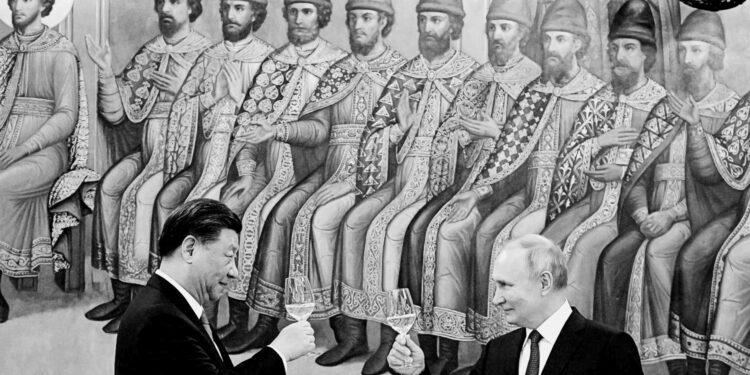Beijing seeks bigger role in the region as Moscow builds up military outposts
Russia and China have carved out a deal to protect their strategic interests in the Arctic as the two countries challenge Nato in the region.
The agreement on “maritime law enforcement” followed a two-day meeting in Murmansk, northwest Russia. The Kremlin is building more military outposts in the region, including deep-water ports and airfields, after Finland, a member of the Arctic Council, joined Nato this month.
Beijing has sought a bigger role in Arctic affairs as political and economic ties with Moscow deepen. Full details are yet to be released after the deal was signed by Yu Zhong, head of the China Coast Guard, and Vladimir Kulishov, first deputy director of Russia’s Federal Security Service (FSB) and head of its border service.

State media reported that Yu later watched a Russian maritime exercise under the Arctic Coast Guard Forum, of which Russia is a member state but China is not.
Moscow regards the region as its back yard and is keen to beat rivals in the West to the vast resources of hydrocarbons in the Arctic shelf. It has lodged a claim with the UN in an attempt to establish a legal right to the riches.
China, which has declared itself a “near-Arctic state”, has long sought to establish a foothold in the area to gain access to its natural resources and shipping lanes. It has proposed a Silk Road on ice, a network of Arctic routes.
Some Arctic states are unconvinced, however. The seven other members of the Arctic Council — Canada, Denmark, Finland, Iceland, Norway, Sweden and the United States — have refused to deal with Russia since it invaded Ukraine. Sweden is seeking to follow Finland and join Nato. China has observer status in the council alongside the UK and 11 other states.
Rand Corporation, an American global policy think tank, said Russia could be China’s best route to greater influence, perhaps by forming a regional governing council.
The Center for Strategic and International Studies, another US think tank, noted that China was looking to Moscow “as its strategic partner of choice in the Arctic”. When President Xi visited the Kremlin last month, President Putin expressed approval that the two countries could develop the Northern Sea Route. Beijing said this month it was willing to tighten its military ties with Russia.
Putin raised the prospect of joint exercises when China’s new defence minister visited Moscow this month.
In September last year, a US Coast Guard crew said they observed a Chinese cruiser in the Bering Sea, between Alaska and Russia, alongside two more Chinese vessels and four Russian ones.
Analysts say Moscow feels threatened by a growing Nato presence in the region and is increasing co-operation with China and other non-Western partners, such as Indian and Middle Eastern companies.
Since western companies withdrew from the Russian Arctic over sanctions linked to the invasion of Ukraine, the Novatek gas producer has explored working with Emirati and Turkish companies to get the technology to build liquefied natural gas projects and a floating power plant.
State media reported that nine Eurasian, Latin American and African countries took part in drills this month in the Russian Arctic.
They were to practise dealing with accidents at mines in Norilsk and Karelia, at a communal heating power plant in Chukotka region and at the Prirazlomnaya oil platform in the Pechora sea off northwest Russia, as well as a shipwreck on the Northern Sea Route and a fire on a nuclear-powered ship in Murmansk. In 2018, China’s national nuclear corporation embarked on a project to develop icebreakers.
In a white-paper document that year, Beijing said it was a stakeholder in Arctic affairs because natural changes in the region would have a direct impact on its climate, environment and economy. As a permanent member of the UN Security Council, China said it shouldered “the important mission of jointly promoting peace and security in the Arctic”.
Last month, 20,000 Nato troops, as well as soldiers from Finland and Sweden, trained to defend Norway in the Joint Viking and Joint Warrior exercises, the largest drills in Europe’s Arctic region this year.
The Joint Warrior exercises, which are held twice a year, were led by Britain and Norway.
Source: The Times



Recent Comments